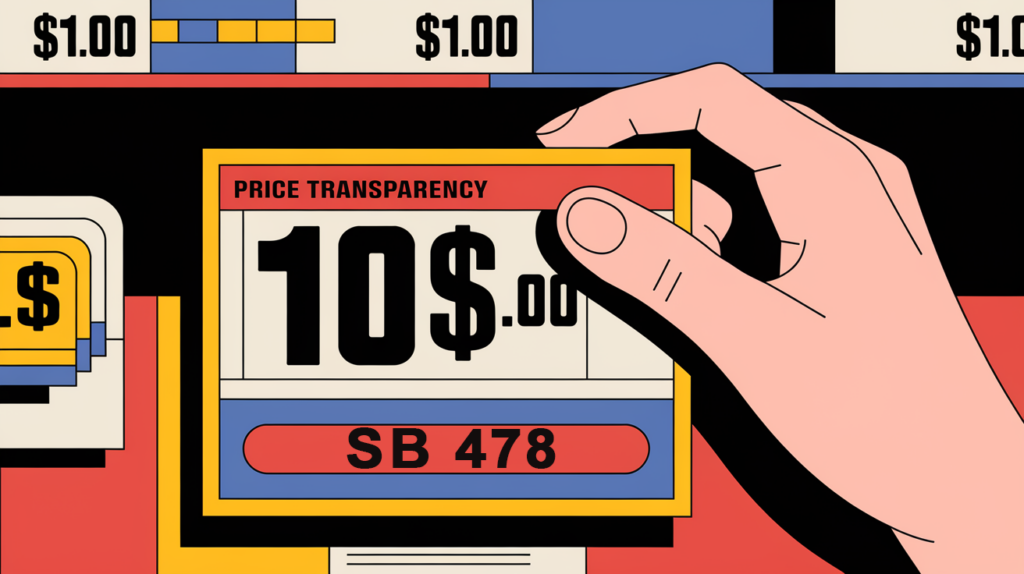Starting July 1, 2024, California businesses face new requirements on how they display prices for goods and services. Senate Bill 478 (SB 478), known as the “Honest Pricing Law,” aims to increase transparency and prevent consumers from encountering unexpected fees at checkout. This blog post will break down the key provisions of SB 478 and explain what it means for your business.
Key Takeaways
- Mandatory fees must be included in the advertised price.
- “Drip pricing” is now illegal in California.
- Businesses must clearly disclose all mandatory charges upfront.
- Non-compliance can lead to legal penalties.
What is SB 478?
SB 478 amends the California Consumer Legal Remedies Act to prohibit businesses from advertising a price that doesn’t include all mandatory fees and charges, with the exception of government taxes and reasonable shipping costs. This means the price you advertise must be the price the customer pays at checkout.
What is “Drip Pricing”?
“Drip pricing” is a deceptive practice where businesses advertise a low price to lure customers in, only to add additional mandatory fees during the checkout process. This leads to a final price that’s higher than what was initially advertised, often causing frustration and distrust among consumers. SB 478 effectively outlaws this practice in California.
What Fees Must Be Included in the Advertised Price?
Any mandatory fee or charge that a customer must pay to purchase the advertised good or service must be included in the initial price display. This includes service fees, processing fees, handling fees, or any other mandatory charge.
What Fees Can Be Excluded?
SB 478 allows for certain exclusions from the advertised price:
- Government-imposed taxes: Sales tax, for example, can still be added at checkout.
- Reasonable shipping costs: If shipping costs are clearly communicated and calculated based on factors like weight, distance, and delivery method, they don’t need to be included in the advertised price.
Optional Fees
Optional fees for add-on services or features that a customer can choose to accept or decline do not need to be included in the advertised price. For example, if you offer expedited shipping for an additional fee, that fee can be presented separately during checkout.
Penalties for Non-Compliance
Businesses that fail to comply with SB 478 may face legal action from consumers or the California Attorney General’s office. Penalties can include:
- Actual damages
- Restitution
- Punitive damages
- Attorney fees
Real-World Examples Across Industries
- Restaurants: Imagine a restaurant advertises a “prix fixe” menu for $50. However, at checkout, the restaurant adds a mandatory 20% service charge, bringing the total to $60. Under SB 478, this practice would be prohibited. The restaurant would need to advertise the prix fixe menu for $60 upfront, inclusive of the service charge.
- Hotels: Resort fees or mandatory cleaning fees must be included in the advertised room rate.
- Event Ticketing: A ticket seller cannot advertise a base ticket price and then add mandatory processing fees at checkout.
- Online Retailers: An online store selling electronics must include any mandatory handling or processing fees in the advertised price of the product.
FAQ Section
Q: Does SB 478 apply to online businesses?
A: Yes, SB 478 applies to all businesses that sell goods or services to California consumers, including online retailers, e-commerce platforms, and brick-and-mortar stores.
Q: How can I ensure my business complies with SB 478?
A: Review your pricing practices and ensure all mandatory fees are included in your advertised prices. Clearly disclose any optional fees or charges separately. If you have questions or need assistance, consult with a qualified legal professional.
Q: What if I have a legitimate reason for adding a fee after the initial price display?
A: SB 478 focuses on mandatory fees. If a fee is truly optional and the customer has a clear choice to accept or decline it, then it likely doesn’t need to be included in the advertised price. However, it’s crucial to be transparent and avoid deceptive practices.
Resources
To help you navigate SB 478, here are some valuable resources:
- Official SB 478 Text
- California Department of Consumer Affairs: www.dca.ca.gov
- California Attorney General’s Office: www.oag.ca.gov
Connecting with XOA TAX
Navigating the complexities of sales tax and compliance with new legislation like SB 478 can be challenging. At XOA TAX, we can help you understand your obligations and ensure your business practices are aligned with California law. Contact us today for a consultation:
Website: https://www.xoatax.com/
Phone: +1 (714) 594-6986
Email: [email protected]
Contact Page: https://www.xoatax.com/contact-us/
Disclaimer: This post is for informational purposes only and does not provide legal, tax, or financial advice. Laws, regulations, and tax rates can change often, and vary significantly by state and locality. This communication is not intended to be a solicitation and XOA TAX does not provide legal advice. Please consult a professional advisor for advice specific to your situation.




 anywhere
anywhere  anytime
anytime